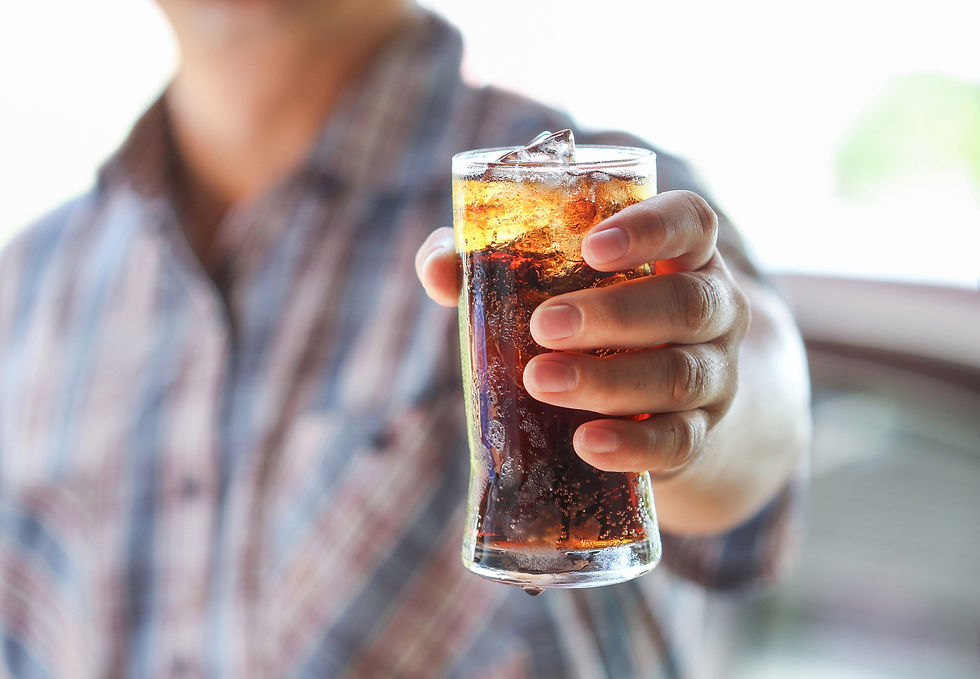Why Should Your Mouth Stay Away From Diet Sodas? Learn With Salem, OR Family & General Dentist
- Sunrise Emergency Dentist

- Jan 17, 2022
- 3 min read
Updated: Dec 1, 2022

Diet sodas may be a tempting choice for people seeking to cut down on sugar and calorie intake, but the truth is that “diet” sodas may just be an empty promise. Studies suggest that diet sodas actually cause weight gain and other unwanted health issues. And due to their high acidity, diet sodas are just as damaging to tooth enamel and oral health as regular sodas.
Diet Soda vs. Regular Soda for Oral Health?
One might think that diet sodas are better for teeth than regular sodas, since artificial sweeteners don’t promote bacteria and acid production in our mouths like sugar does. However, numerous studies show that the high acid content of all sodas causes tooth erosion at roughly the same rate, regardless of sugar content.

Regular sodas provide a double whammy on your teeth with both acid and sugar, the latter of which bacteria feeds on to produce acid. However, diet sodas typically contain the exact same acid as regular soda (phosphoric acid) plus additional acids (citric acid, tartaric acid).
A study at the University of Melbourne tested 15 different sodas to study their effects on healthy molars. Researchers found that all 15 beverages, whether they contained sugar or artificial sweeteners, caused about the same amount of tooth erosion in the same amount of time. Another study at the University of Michigan had similar results.
Drinking soda causes an acid attack on teeth that lasts for about 20 minutes, which restarts with each sip. These acids strip tooth enamel of minerals, which over time results in tooth sensitivity, a chalky appearance, pitting, opacity changes, and higher risk of tooth decay (aka dental caries, or cavities).
Tips for Lessening the Risk of Tooth Decay with Sodas
Use a straw to minimize contact with teeth.
Drink all in one sitting rather than sipping slowly, so that your mouth won’t be bathed in enamel-attacking-acid over a long period of time.
Drink soda along with eating a meal to partially neutralize the acid and encourage saliva production.
Rinse your mouth with water after drinking sodas and other sugary or acidic beverages.
Wait at least 30 minutes after drinking before brushing your teeth - your mouth needs time to return to its normal pH level, and brushing too quickly can actually cause damage to your already weakened tooth enamel.
Enjoy sporadically: drinking soda a couple times a week lessens risk better than drinking one 12oz can a day.
Bonus: Does Diet Soda Cause Health Issues?
Even though the sugar substitutes in diet sodas have zero or very few calories, regularly drinking diet sodas may still contribute to issues like weight gain and other unwanted health problems.
Why? Our bodies and brains are conditioned to expect sweet things to be packed with calories, which our bodies use as energy. So when you eat something sweet but it lacks the food energy that your body expects, it may cause the brain to signal that your body needs to eat more in order to make up for those missing calories.

Artificial sweeteners may also interfere with our metabolic processes. When you regularly consume zero (or negligible) calorie sweeteners, your body may stop releasing the hormones that rev up metabolism -- then when you do eat caloric foods, your body might not be prepared to effectively metabolize real sugar and calories, which could lead to high blood sugar and weight gain.
Scientists are still learning about the effects of the various artificial sweeteners on our human bodies, but several animal studies have shown that some artificial sweeteners (particularly aspartame) caused severe health hazards, including weight gain, brain tumors, and bladder cancer. Some observational studies of the effects of artificial sweeteners on humans also link them to increased health risks such as type 2 diabetes and metabolic syndrome, which increases the risk of heart disease and stroke.







